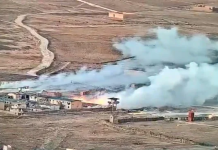KABUL, MAY 8: A bomb explosion in Afghanistan’s volatile northeastern Badakhshan province Wednesday killed at least three Taliban security personnel and wounded six others.
Multiple sources, including residents and area hospital officials, confirmed the casualties. They said that a “sticky improvised explosive device” apparently planted on a motorbike struck a Taliban military convoy in the provincial capital, Faizabad.
The Taliban’s Interior Ministry spokesman confirmed the casualties, saying the bomb targeted a unit of security forces that were heading to illegal poppy fields to destroy them. Abdul Mateen Qani said the attack was under investigation.
No group claimed responsibility for the bombing in Badakhshan, which has been in the grip of unprecedented violent public protests against Taliban authorities’ poppy eradication campaign. The unrest erupted last Friday and left two protesters dead in clashes with Taliban security forces.
Wednesday’s deadly blast came a day after the Taliban’s army chief, Fasihuddin Fitrat, said in a video message that he had addressed complaints of protesting farmers and resolved the unrest. He insisted on receiving public support for poppy eradication.
Fitrat arrived in Faizabad from Kabul two days ago as the head of a high-powered delegation to negotiate with the demonstrators’ leaders.
Ahead of his visit to the province, the Taliban army chief had threatened to militarily “quell the rebellion” if the demonstrations persisted. He reiterated his government’s resolve to eradicate poppy cultivation in Afghanistan and vowed to achieve this goal, come what may.
Since regaining control of the country, the Taliban’s reclusive supreme leader, Hibatullah Akundzada, has imposed a nationwide ban on poppy cultivation, production, usage, transportation, and trade of illicit drugs.
However, deteriorating economic conditions and the absence of alternatives for poppy-growing farmers have been causing unrest in parts of Afghanistan against the ban, which went into effect in April 2022.
The United Nations estimates the ban on poppy cultivation rendered some 450,000 people jobless in poverty-stricken Afghanistan and precipitated a $1.3 billion loss in farmers’ incomes.
Badakhshan and surrounding Afghan provinces are ethnically non-Pashtun regions. The Taliban, who represent the country’s majority Pashtun population, were unable to take control of the northern provinces during their first stint in power in the 1990s.
Critics argue that the rare public uprising in Badakhshan highlights the potential obstacles that the Taliban may face in maintaining their authority in Afghanistan, reeling from decades of war and the effects of natural disasters, such as earthquakes, floods, and droughts.

















